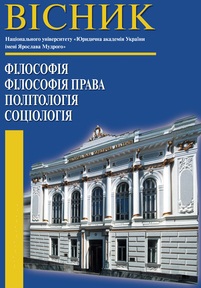ІСНУВАННЯ НОРМ ПРАВА ЯК ПРОБЛЕМА В ДЕОНТИЧНІЙ ЛОГІЦІ
EXISTENCE OF NORMS OF LAW AS A PROBLEM IN DEONTIC LOGIC
Author(s): Olena Mykolaivna YurkevychSubject(s): Ethics / Practical Philosophy, Philosophy of Law
Published by: Національний юридичний університет імені Ярослава Мудрого
Keywords: deontic logic; the existence of a rule of law; prescriptive norms; descriptive norms; corpus of law; legal authority;legal system;
Summary/Abstract: Problem setting. The existence of the rule of law as a problem of deontic logic is defined in the plane of logical and ontological problems of law, its origin is connected with the Jorgensen dilemma. The study of legal norms as existing established their inconsistency with the ideal of rational science. The existence of contradictions and gaps in the law does not correspond to the principles of consistency and completeness. The study of existing legal norms requires the further development of deontic concepts, clarification of the criteria for the existence and logical significance of legal norms, the development of formalization, and so on.Recent research and publications analysis. The origin of deontic logic is associated with the name of Aristotle, later it was systematically investigated by G.V. F. Leibniz, I. Bentham, in the twentieth century it was finally formed. In the works of S. Mali, A. Hoffler, E. Menger, an axiomatic system for describing deontic concepts was created. The problem of the existence of legal norms in deontic logic was posed in the work “Deontic Logic” by G. von Wrigt and later investigated in the writings of K. Alchurron and E. V. Bulygin, who analyzed the completeness and consistency of the legal system, conflicts in legislation and “white spots” "in the right. They first created the formal theory of norms as a second-order logical theory. In Ukraine, research on deontic logic was carried out by A. E. Konversky, S. I. Maksimov, E. N. Yurkevych and others.Paper objective. The purpose of the study is to reveal the problem of the existence of rules of law in terms of the tasks of logical analytics, the level of development of logical tools in deontic logic, taking into account and deepening knowledge of the logic of practical thinking of lawyers.Paper main body. Modern deontic logic explores logical forms and the rules for their application in normative contexts. These contexts are sets of prescriptive and descriptive statements. The deontic concept connects the content of the utterance with a certain action under certain conditions. This creates the character of the norm. Systems of deontic logic are based on the traditional logic of utterances and the interdependence of deontic concepts (“forbidden”, “obligatory”, “allowed”). In deontic deduction, the conclusion is made by analogy with the action and is evaluated in terms of "justified" / "permissible", and not "true" / "false". The basic principles for the deontic system are the principles of deontic completeness and consistency. The existence of rules of law determines their strength and is associated with the establishment or termination of the regulatory relationship, which is the relationship between the authority and the subject of the norm. To consider the various aspects of normative relations, the concepts of different degrees of abstraction are taken: communication, utterance and proposition. The principle of consistency of the norm determines the possibility of its implementation, and hence the possibility of its existence. Conflicting rules issued by different authorities may exist ("conflict of will"). And the contradictory norms formulated by one instance mean the presence of irrational will. The introduction of the ontological criterion of rational / irrational will becomes crucial for the logic of practical thinking regarding the existence of legal norms. Conflicting norms in the same norms corpus cannot be simultaneously enforceable. In the formalization of deontic expressions, propositional norms are reduced to propositions about the existence of norms, provided that the norm is promulgated by a certain authority.Conclusions of the research. The development of the problem of the existence of rules of law in deontic logic has developed a logical methodology by deepening knowledge of ontological topics and logic of practical thinking, expanding the concept of the corpus of rules of law, rethinking the principles of consistency and completeness of the legal system, as well as the possibilities and symbolic instrumentalization, which logistical tools, symbolization of legal instance, clarification of logical meanings with respect to existing norms.
Journal: Вісник НЮУ імені Ярослава Мудрого. Серія: Філософія, філософія права, політологія, соціологія
- Issue Year: 44/2020
- Issue No: 1
- Page Range: 39-52
- Page Count: 14
- Language: Ukrainian

